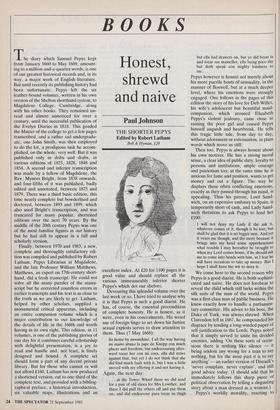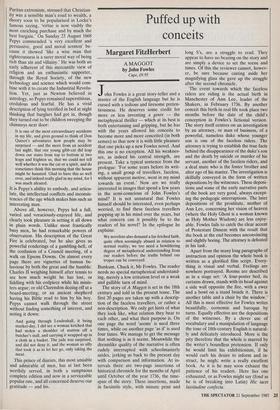BOOKS
The diary which Samuel Pepys kept from January 1660 to May 1669, amount- ing to a million-and-a-quarter words, is one of our greatest historical records and, in its way, a major work of English literature. But until recently its publishing history had been unfortunate. Pepys left the six leather-bound volumes, written in his own version of the Shelton shorthand system, to Magdalene College, Cambridge, along with his other books. They remained un- read and almost unnoticed for over a century, until the successful publication of the Evelyn Diaries in 1818. This goaded the Master of the college to get a few pages transcribed, and a rather sad undergradu- ate, one John Smith, was then employed to do the lot, a prodigious task he accom- plished, on the whole, very well. But it was published only in dribs and drabs, in various editions of 1825, 1828, 1848 and 1854. A second and inferior transcription was made by a fellow of Magdalene, the Rev. Mynors Bright, from 1858 onwards, and four-fifths of it was published, badly edited and annotated, between 1875 and 1879. There was a third basic edition, this time nearly complete but bowderlised and doctored, between 1893 and 1899, which also used Bright's transcription, and was truncated for many popular, shortened editions over the next 70 years. By the middle of the 20th century Pepys was one of the most familiar figures in our history but he had still to appear in a full and scholarly version.
Finally, between 1970 and 1983, a new, complete and thoroughly satisfactory edi- tion was compiled and published by Robert Latham, Pepys Librarian at Magdalene, and the late Professor William Matthews. Matthews, an expert on 17th-century short- hand, did a fresh transcript. He could not solve all the many puzzles of the manu- script but he corrected countless errors in earlier transcripts and his text is as close to the truth as we are likely to get. Latham, helped by other scholars, supplied a monumental critical apparatus, including an entire companion volume which is a major contribution to our knowledge of the details of life in the 1660s and worth having in its own right. This edition, in 11 volumes, is one of the publishing glories of our day for it combines careful scholarship with delightful presentation, is a joy to read and handle and, not least, is finely designed and bound. A complete set should form a part of any decent private library. But for those who cannot or will not afford £160, Latham has now produced a shortened version, cut to one-third of the complete text, and provided with a bibliog- raphical preface, a historical introduction, six valuable maps, illustrations and an
Honest, shrewd and naive
Paul Johnson
THE SHORTER PEPYS Edited by Robert Latham
Bell & Hyman, £20
excellent index. At f20 for 1100 pages it is good value and should replace all the various immeasurably inferior shorter Pepys's which dot our shelves.
Devouring this splendid volume over the last week or so, I have tried to analyse why it is that Pepys is such a good diarist. He has, of course, the essential precondition of complete honesty. He is honest, as it were, even in his concealments. His weird use of foreign lingo to set down his furtive sexual exploits serves to draw attention to them. Thus (7 May 1668): So home by moonshine, I all the way having mi mano abaxo la jupe de Knepp con much placer and freedom; but endeavouring after- ward tocar her con mi cosa, ella did strive against that, but yet I do not think that she did find much fault with it, but I was a little moved with my offering it and not having it.
Again, the next day: . . . at the Tower Wharf there we did send for a pair of old shoes for Mrs Lowther, and there I did pull the others off and put them on, and did endeavour para tocar su thigh
but ella had drawers on, but yo did besar la and tocar sus mamelles, ella being poco shy but doth speak con mighty kindness to me. . .
Pepys however is honest not merely about his more puerile bouts of sensuality, in the manner of Boswell, but at a much deeper level, where his emotions were strongly engaged. One follows in the pages of this edition the story of his love for Deb Willet, his wife's adolescent but beautiful maid- companion, which aroused Elizabeth Pepys's violent jealousy, came close to ruining the poor girl and caused Pepys himself anguish and heartbreak. He tells this tragic little tale, from day to day, without adornment or extenuation, in plain words which move us still.
Then too, Pepys is always honest about his own motives. He has a strong moral sense, a clear idea of public duty, loyalty to persons and institutions, ample courage and patriotism too; at the same time he is anxious for fame and position, wants to get money and cut a figure. The way he displays these often conflicting emotions, exactly as they passed through his mind, is appealing. Thus his patron, Lord Sand- wich, on an expensive embassy to Spain, is temporarily short of cash, and Lady Sand- wich threatens to ask Pepys to lend her £100: I will not deny my Lady if she ask it, whatever comes of it, though it be lost; but shall be glad that it is no bigger sum. And yet it vexes me though, and the more because it brings into my head some apprehensions what trouble I may hereafter be brought to when my Lord comes home, if he should ask me to come into bonds with him, as I fear he will have occasions to take up money. But I hope I shall have the wit to deny it.
We come here to the second reason why Pepys is a good diarist. He is both sophisti- cated and naive. He does not forebear to reveal the child which still lurks within the silk suits of the man of the world. Pepys was a first-class man of public business. He knew exactly how to handle a parliamen- tary committee. His advice to his boss, the Duke of York, was always shrewd. When Clarendon fell in 1667, he compounded his disgrace by sending a long-winded paper of self-justification to the Lords. Pepys noted that it simply served to unite his divided enemies, adding 'On these sorts of occas- sions there is nothing like silence — it being seldom any wrong for a man to say nothing, but for the most part it is to say anything' — an earlier version of Disraeli's `never complain, never explain', and still good advice today. (I should add that he immediately follows this sharp piece of political observation by telling a disgusting story about a man dressed as a woman.) Pepys's worldly morality, reacting to Puritan extremism, stressed that Christian- ity was a sensible man's road to wealth, a theory soon to be popularised in Locke's famous saying, 'virtue is now visibly the most enriching purchase and by much the best bargain.' On Sunday 23 August 1668 Pepys commended 'a very excellent and persuasive, good and moral sermon' be- cause it showed 'like a wise man that righteousness is a surer moral way of being rich than sin and villainy.' He was both an early adherent of this mercantile view of religion and an enthusiastic supporter, through the Royal Society, of the new technology and science which would com- bine with it to create the Industrial Revolu- tion. Yet, just as Newton believed in astrology, so Pepys remained superstitious, credulous and fearful. He has a vivid description of lying terrified in bed at night thinking that burglars had got in, though they turned out to be children sweeping the chimneys next door:
It is one of the most extraordinary accidents in my life, and gives ground to think of Don Quixot's adventures how people may be surprised — and the more from an accident last night, that our young gibb-cat did leap down our stairs from top to bottom at two leaps and frighten us, that we could not tell well whether it was the cat or a spirit, and do sometimes think this morning that the house might be haunted. Glad to have this so well over, and indeed really glad in my mind, for I was much afeared.
It is Pepys's ability to embody, and articu- late, the intellectual conflicts and inconsis- tencies of the age which makes him such an interesting man.
Above all, however, Pepys led a full, varied and voraciously-enjoyed life, and clearly took pleasure in setting it all down in plain words. Unlike most frantically busy men, he had remarkable powers of observation. His description of the Great Fire is celebrated, but he also gives us powerful renderings of a gambling-hell, of the confusion of a Council meeting, of a walk on Epsom Downs. On almost every page there are vignettes of human be- haviour by both the great and the humble: Charles II weighing himself after tennis to see how much weight he has lost, or fiddling with his codpiece while his minis- ters argue; or old Clarendon dozing off at a board-meeting; or an ancient shepherd having his Bible read to him by his boy. Pepys cannot walk through the street without finding something of interest, and noting it down: And going through Leadenhall, it being market-day, I did see a woman ketched that had stolen a shoulder of mutton off a butcher's stall, and carrying it wrapped up in a cloth in a basket. The jade was surprised, and did not deny it; and the woman so silly that took it as to let her go, only taking the meat.
This prince of diarists, this most amiable and admirable of men, has at last been worthily served, in both a sumptuous complete edition and now in a serviceable popular one, and all concerned deserve our gratitude — and his.















































 Previous page
Previous page